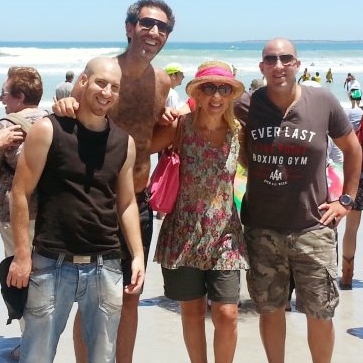
SA

Positively coming to terms with grief
MOIRA SCHNEIDER
“The words ‘Something terrible has happened to Brett’ needed no explanation,” the former long-time Herzlia educator recalled as she shared her story at the Nechama Counselling for the Bereaved seminar last week. “I knew instinctively that Brett had passed away.”
Some 23 years earlier, Maxine had received another traumatic call informing her that seven-year-old Brett had been involved in a terrible motor accident. There followed years of struggle which included coping with minimal brain dysfunction and a “trache”.
“I was determined that Brett’s passing would be an opportunity for me to grow and learn,” the single mother said. “I did have an idea of what I was capable of surviving,” she said, referring to her son’s childhood accident, “but Brett’s loss was to become the greatest life lesson for me.”
Maxine said she had never questioned: “Why Brett?” simply because there was no answer. Nor had she experienced feelings of guilt or anger at his passing.
“It happened. I was powerless to change the situation, so for me it was a case of live my best life thereafter. I will grieve for the rest of my life, every day and in my own way.”
She made a conscious decision to make the best of every day. “I would continue to wear colourful clothes, paint my face every morning and look in the mirror at a face that knew there was a life worth living, albeit accompanied by an underlying sadness.”
So, a few weeks after the tragic accident, Maxine resolved to resume her successful extra-lessons practice, something that proved to be “a wonderful escape”.
Looking back, she realises that she has learnt “so much” in dealing with grief. “Grief is portable, silent, deeply personal and always present,” she reflects.
“How I deal with its nature is dependent on what goes on around me on any given day. It shows up when and where it feels like doing so.
“In the box of bright green Future Life cereal Brett loved, the Axe deodorant on the Pick n Pay shelf, the smell of challah baking on a Friday morning, a Lionel Ritchie song – Brett couldn’t stand him – the list of triggers is infinite.
“But each one of them is a slice of my loss. Sometimes I allow myself to be vulnerable and I have a mighty sob. Other times I stand and stare at the many photos of Brett that adorn every available space in my home.
“Brett’s room has remained Brett’s room. The mountain of clothes on his chair is still there… it’s Brett.
“His siddur and kippah remain in the same place along with some of his other personal belongings. Not to be moved until I sell my home one day.”
She has moved on, she says, identifying acceptance as being pivotal to the process. She recalls the early days after Brett’s passing, when people would proceed to tell her how she was feeling.
“I made it clear to them not to assume that everything was terrible and awful and life not possible to continue… just ask me how I was feeling that day and give me the opportunity to tell you.
“I totally understand that if you have not lost a child it is not possible to know what goes on in the heart, mind and soul of the parent.”
She says that she has gained the strength to face up to any issues. “I have crawled back from loss and now there is no longer fear of anything.
“What is there that is worse than losing a child? Nothing.”




